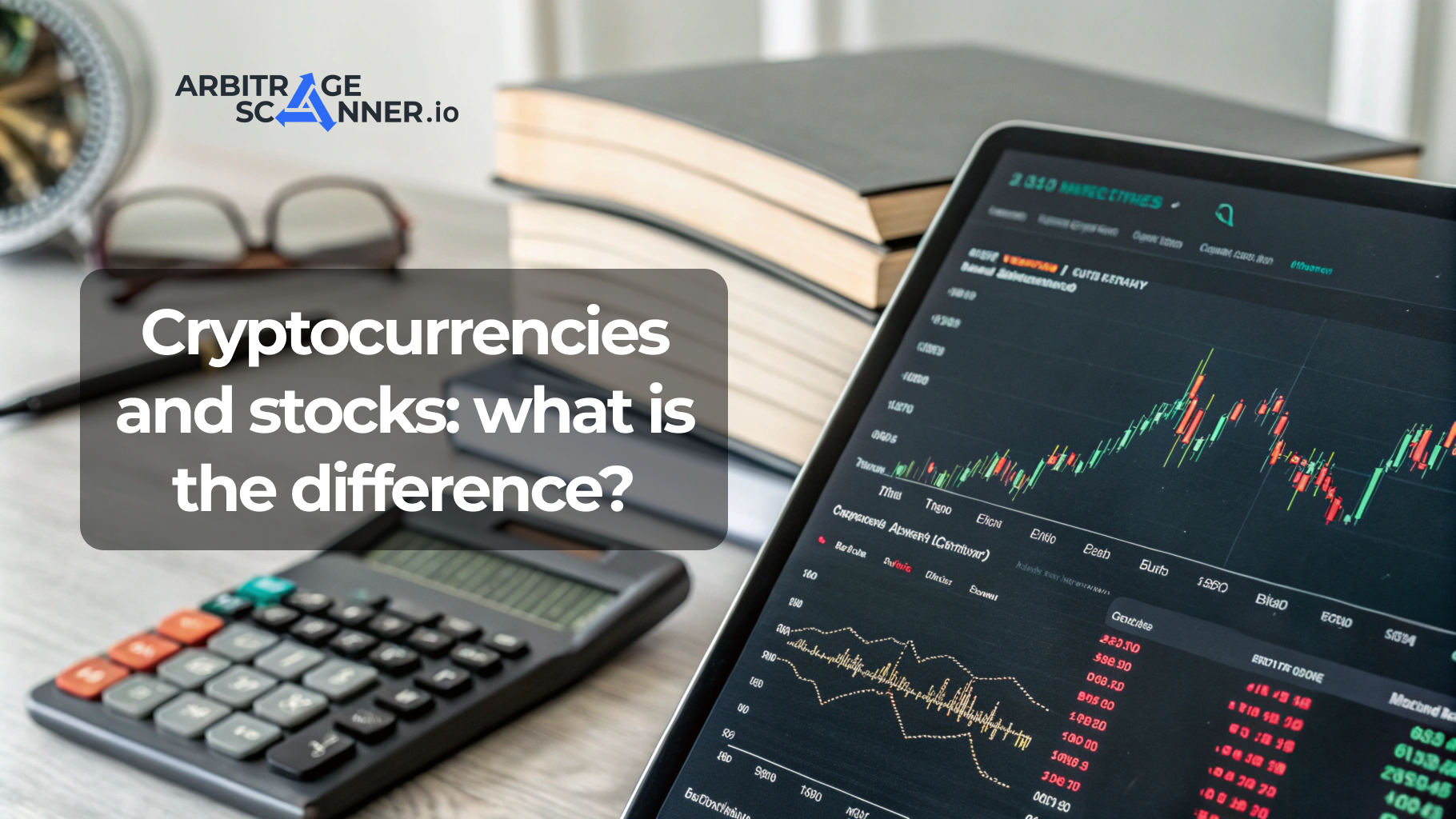Cryptocurrencies and stocks: what is the difference?

Defining Assets
Stocks – regulated financial assets that provide their owners with a share in the ownership of a public company. Stocks are traded on exclusively regulated stock exchanges: NYSE in the USA, LSE in France, the Moscow Exchange in Russia, and others. The stock market began to emerge as early as the 16th century, which is why investing and trading stocks occur only within the legal framework.
Cryptocurrencies – are distributed across blockchains supported by a decentralized consensus involving many independent nodes, sometimes numbering in the thousands. They function as digital currencies used for storing and transferring value within their blockchains. In addition to operating directly within blockchain networks, cryptocurrencies also circulate outside them and can be traded on both centralized (CEX) and decentralized exchanges (DEX).
Comparing Cryptocurrencies and Stocks: Similarities and Differences
Similarities:
-
Price and Market Value. Both stocks and cryptocurrencies are valued based on market price, determined by supply and demand. Their price depends on how much investors are willing to pay for them. For example, if the demand for a particular asset increases, its price rises.
-
Tradability. Both types of assets can be bought and sold on exchanges, making them accessible to individual and institutional investors. Stocks are traded on centralized exchanges (NYSE, NASDAQ), while cryptocurrencies are traded on centralized and decentralized platforms (CEX and DEX).
Differences:
-
Regulation and Insider Trading. The stock market is regulated by government agencies (e.g., the SEC in the USA) to prevent insider trading and protect the rights of outsiders. Cryptocurrency exchanges operate on different principles, and many countries do not fully control their operations, creating opportunities for manipulation and schemes like "Pump and Dump."
-
Insurance Availability. When purchasing stocks through a licensed broker, investors are insured in case of the broker's bankruptcy. In cryptocurrencies, insurance is absent, except for some exchanges like Coinbase, which offer partial protection for cash deposits but not for cryptocurrency assets;
-
Valuation Methods. Stocks are valued using various models (P/E, NAV, DCF) based on the company's financial statements and economic indicators. Cryptocurrencies do not lend themselves to such valuation methods, as companies issuing tokens are not required to publish reports;
-
Ownership and Rights. Buying stocks gives the investor a share of the company's assets and voting rights at shareholder meetings. Owning cryptocurrency does not grant any rights to the property of the company issuing the token;
-
Operating Hours. Stock markets have operating hours – they are closed at night and on weekends, giving investors the opportunity to plan trades. Cryptocurrency exchanges operate 24/7, without breaks on weekends and holidays, requiring traders to be constantly vigilant.
These differences highlight that while cryptocurrencies and stocks have certain similarities, their valuation approaches, risks, and legal aspects differ significantly.
Pros and Cons of Investing in Cryptocurrencies
Pros:
-
High Growth Potential. Cryptocurrencies can significantly increase in price over a short period, especially during waves of popularity and interest in specific sectors of the crypto market (NFT, DeFi, RWA, and others);
-
Accessibility and 24/7 Trading. Crypto exchanges operate 24/7, allowing trading without time constraints and workdays;
-
Low Entry Barrier. Investing in cryptocurrencies can be done with a small amount of money, making them accessible to a wide range of people;
-
Possibility of Anonymous Transactions. Many crypto exchanges and wallets allow for anonymous transactions, which is attractive to some investors.
Cons:
-
High Volatility and Risks. Cryptocurrencies are subject to significant price fluctuations, and sharp declines can lead to substantial losses;
-
Lack of Regulation and Protection. The cryptocurrency market is often unregulated, creating risks of manipulation, "Pump and Dump" schemes, and fraud;
-
Lack of Insurance. In the event of loss of funds due to a hack or loss of access to a wallet, the investor receives no compensation;
-
Difficulty in Assessing Real Value. Cryptocurrencies lack financial reports or assets for analysis, making it practically impossible to determine their "fair" value.
Pros and Cons of Investing in Stocks
Pros:
-
Relatively Low Volatility. Compared to cryptocurrencies, stocks are more stable, especially in large and mature companies;
-
Insurance and Investor Protection. Stocks purchased from licensed brokers are protected by insurance programs, and the market is regulated by the government, reducing the risk of fraud;
-
Dividends. Many companies pay dividends, providing investors with regular income in addition to the appreciation of stock prices;
-
Valuation and Forecasting Methods. There are proven valuation methods that help investors make more informed decisions.
Cons:
-
Limited Operating Hours. Stock trading is only available during the exchanges' operating hours, limiting investors' flexibility;
-
Low Potential for Supernormal Profits. While stocks provide stable income, they rarely show the same growth as some cryptocurrencies, especially in their early stages;
-
Requirement for Significant Investments. Some stocks can be expensive, and a diversified portfolio requires higher investments compared to cryptocurrencies;
-
Insider Trading and Corporate Risks. Despite regulation, the stock market is not immune to manipulation and corporate scandals that can sharply devalue a company's stocks.
Conclusion
In most developed countries, stock trading is strictly regulated to protect investors' rights. In contrast, the cryptocurrency market is largely unregulated, and most exchanges operate freely, adhering only to the basic legal requirements of a given country. For the average investor, the lack of control can have its consequences.
The cryptocurrency market offers greater flexibility: crypto exchanges operate 24/7, allowing transactions without time constraints. Additionally, the volatility of cryptocurrencies is significantly higher, creating more opportunities for profit.
Want to learn more about crypto arbitrage?
Get a subscription and access the best tool on the market for arbitrage on Spot, Futures, CEX, and DEX exchanges.








